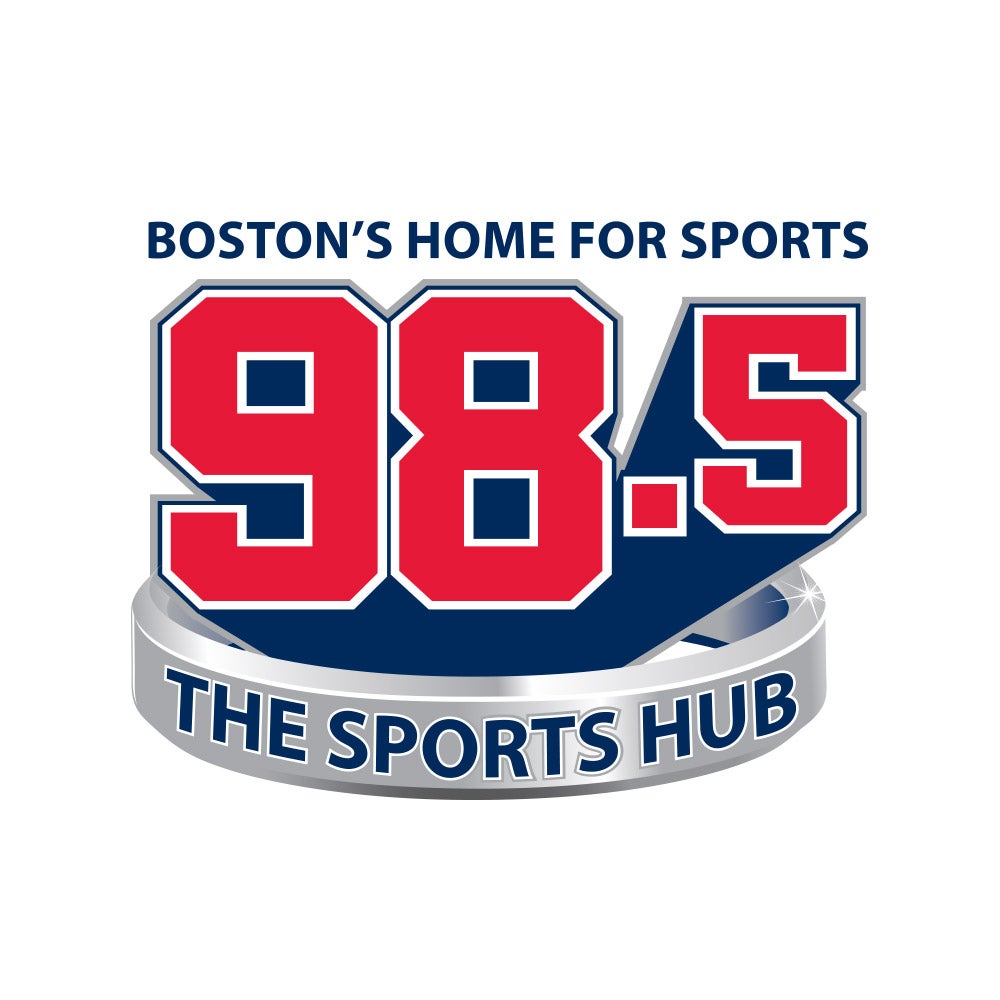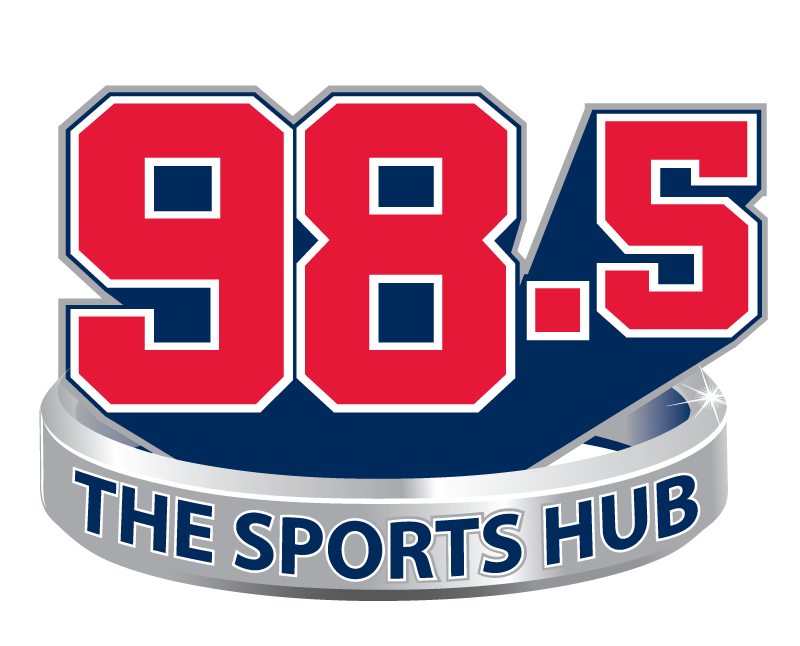One last time: 10 years ago, the Celtics and Lakers battled for hoops supremacy
By Sean Sylver, 98.5 The Sports Hub Game 7. Celtics-Lakers. Ten years ago, a scenario dreamed out in millions of driveways and municipal parks over half a century became a reality….

LOS ANGELES, CA – JUNE 17: Kobe Bryant #24 of the Los Angeles Lakers goes up for a dunk over Paul Pierce #34 of the Boston Celtics in Game Seven of the 2010 NBA Finals at Staples Center on June 17, 2010 in Los Angeles, California. NOTE TO USER: User expressly acknowledges and agrees that, by downloading and/or using this Photograph, user is consenting to the terms and conditions of the Getty Images License Agreement. (Photo by Christian Petersen/Getty Images)
Christian Petersen/Getty ImagesBy Sean Sylver, 98.5 The Sports Hub
Game 7.
Celtics-Lakers.
Ten years ago, a scenario dreamed out in millions of driveways and municipal parks over half a century became a reality. The NBA’s two most decorated franchises - winners of the past two Larry O’Brien trophies - were locked in an old school slugfest that could go either way.
“It was like watching 50 years of history teeter back and forth on the narrowest of ledges,” remembers Hall of Fame hoops scribe Mark Heisler.
It wasn’t an aesthetic masterpiece by today’s standards. Bill Simmons described it as “a cross between a rugby match and a rockfight.” The principals - Kobe Bryant, Kevin Garnett, Paul Pierce, Ron (not yet Metta) Artest - cut their teeth in a different NBA: one with fewer threes, fewer analytics and fewer rules.
Game 7 of the 2010 NBA Finals remains second the lowest-scoring Finals game of the past decade.
With 6:29 left, Boston’s 13-point lead is down to one. Ray Allen coolly steps to the free throw line and drains both shots. It’s a three-point game.
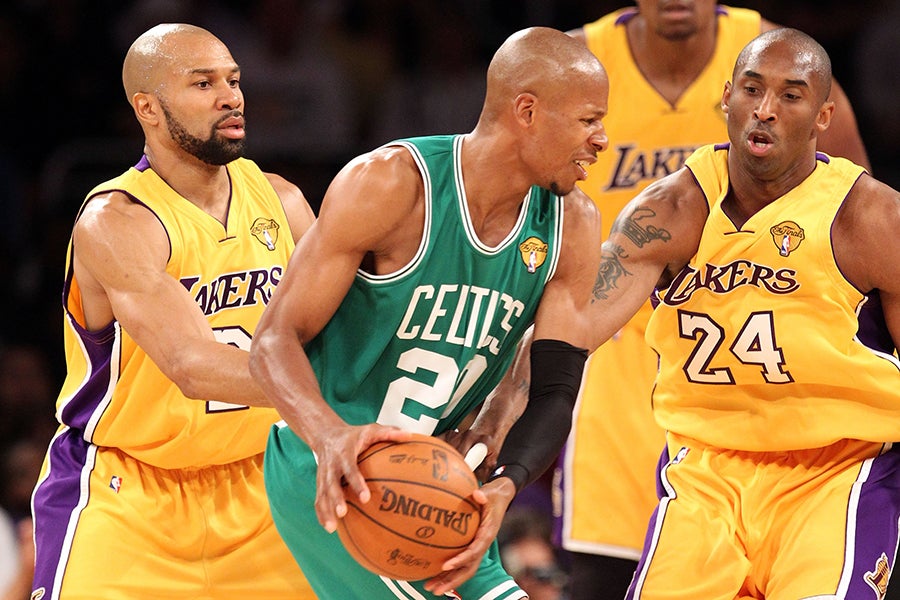 Ronald Martinez/Getty Images÷
Ronald Martinez/Getty Images÷Ray Allen of the Boston Celtics looks to move the ball as he is covered by Derek Fisher and Kobe Bryant of the Los Angeles Lakers in the first quarter of Game 7 of the 2010 NBA Finals. (Photo by Ronald Martinez/Getty Images)
And to hear legendary Boston sportswriter Bob Ryan tell it, “they had disaster in 94 seconds.”
“Here comes Derek Fisher doing what Derek Fisher did more than once in his career: he hits the big three. In 94 seconds - three possessions - they went from up three to down six. And that was the game.”
The Lakers popped champagne that night - the bubbles a salve for their bruises, abrasions and 42 percent shooting for the series. Bryant collected a second consecutive Finals MVP trophy.
In the opposing locker room, the Celtics dealt with the unfathomable reality of blowing a 3-2 series lead.
“Getting on the plane and flying back - I think that was one of the worst feelings I ever had in basketball, and that was with me losing to the Lakers in ‘85,” says 1981 Finals MVP and current Celtics broadcaster Cedric Maxwell. “It felt like the Celtics had that game and just ran out of gas.”
It also would be the last time either team reached the game’s grandest stage.
The Stuff of Legends
http://gty.im/515355424
The Celtics and Lakers have met 12 times in the NBA Finals, including a 1959 matchup when the latter franchise was still based in Minneapolis. In the early days of a rivalry curated by titans of the game like Russell, Baylor and West, the Celtics won seven consecutive championship matchups.
Boston made it eight straight in ‘84. But LA emerged victorious in the last two head-to-head encounters of the Magic and Bird decade, during which the Lakers hauled in five trophies to Boston’s three.
The rivalry would lay dormant for 21 years. The Celtics wandered in the desert for much of that period as the Big Three got old and the organization endured two unspeakable tragedies.
Meanwhile, the Lakers were shocked by Magic Johnson’s HIV-driven retirement. Within five years, they’d sign the biggest free agent in the sport (Shaquille O’Neal) and swing a trade for the game’s next superstar (Bryant). Three moe titles followed to start the new Millennium.
By mid-decade, the two most storied franchises in NBA history found themselves among the NBA detritus. The Celtics were also-rans in a weak Eastern Conference, bottoming out during a 24-win 2007 campaign. The Lakers had their own problems.
“(Bryant) was so far down after Shaq left,” Heisler recalls. “He was still in his prime and capable of doing amazing things. But the team was terrible. People forget this, but Kobe was totally reviled around the league. Not only by the fans, but his peers. By and large, basketball players like other basketball players. But Kobe was completely pushed out.”
http://gty.im/576884362
“The most graphic example was, the year after (O’Neal) left. Kobe was beginning to feel a lot of pressure. Everyone was blaming him for running Shaq out of town, which was more or less true. (The Lakers) played their first exhibition game at the Pond in Anaheim against the Seattle SuperSonics. Kobe was guarding Ray Allen. Kobe just jumped on Ray and was pressuring him all game as if it was the seventh game of the Finals. Ray was pissed.”
“Kobe had a little extra something every time he played Ray,” Maxwell muses. “He always said, ‘everybody who was taken before me (in the 1996 Draft), I’m taking a personal vengeance to go at them,’ and you could see that.”
”Afterward,” Heisler says, “Ray told the Seattle writers it wasn’t going to be long before Kobe told Jerry Buss he wanted out of (LA).”
“He basically said that everybody expected Kobe to do what he ultimately did: in 2007, he demanded a trade. He was caught on tape calling Buss a liar.”
Rivalry Renewed
In the summer of 2007, Celtics President of Basketball Operations Danny Ainge faced a similar dilemma to Buss and the Lakers: surround star Paul Pierce with talent or be forced to move his most valuable player. On draft day, Ainge flipped the fifth overall pick (Jeff Green) to Seattle in a package for future Hall of Famer Ray Allen. A month later, Ainge stunned the basketball world, trading five players to Minnesota for former MVP Kevin Garnett.
http://gty.im/130625953
15 years after Larry Bird’s retirement, Boston had a new Big Three.
“When they put the team together, I was profoundly skeptical,” says Ryan. “It takes more than three people to win a championship. But then they made great moves to augment the situation. (James) Posey and Eddie House, specifically, were very important components of that team. As that season unfolded, I was proven happily wrong and it was great.”
The Celtics went 29-3 out of the gate and looked poised for a Finals run. Meanwhile, at the trade deadline, the Lakers pulled themselves back into the championship conversation by adding All-Star big man Pau Gasol.
“All of a sudden, everything fit,” Heisler reflects. “There was a hierarchy and everybody understood and acknowledged it. Pau had no problem with it whatsoever. Despite the fact that Pau had been number one in Memphis, he was naturally a number two guy. Instead of having chemistry problems, they were totally cool with each other.”
The trade was perhaps hastened by the first of many injuries to center Andrew Bynum, who dislocated his left kneecap in January. Bynum would miss the rest of the season and the 2008 NBA Finals, where the Celtics defeated the Lakers in six games. The knockout punch was a 39-point blowout at TD Banknorth Garden.
“The Celtics were clearly the better team,” says Heisler. “They had this great defense; they threw the gauntlet down at Kobe’s feet. They basically set it up so that he kept the ball and dribbled and did everything. Ray Allen would guard him and send him one way or another and there’d always be somebody else picking him up. KG would be back in the lane waiting for Kobe...they really stopped the Lakers from running any kind of an offense with passing and ball movement.”
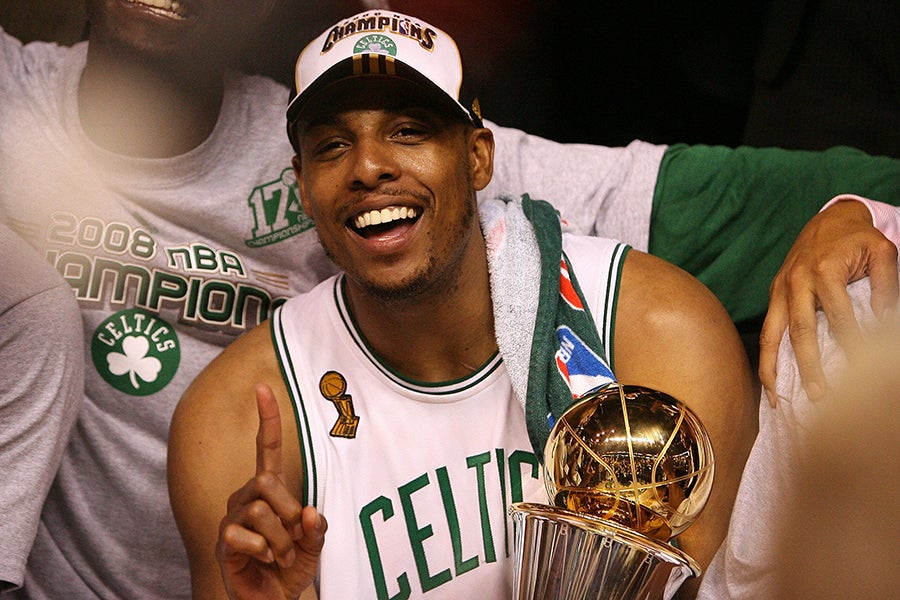
BOSTON - JUNE 17: Paul Pierce #34 of the Boston Celtics celebrates with the NBA Finals MVP trophy after defeating the Los Angeles Lakers in Game Six of the 2008 NBA Finals on June 17, 2008 at TD Banknorth Garden in Boston, Massachusetts. NOTE TO USER: User expressly acknowledges and agrees that, by downloading and/or using this Photograph, user is consenting to the terms and conditions of the Getty Images License Agreement. (Photo by Elsa/Getty Images)
Allen averaged 20 points and shot 51 percent for the series. Pierce took home Finals MVP honors. Garnett went viral.
And the Lakers stewed.
Crowning Achievement/Missed Opportunity
They appeared on a collision course for a rematch in 2009. Boston started an astounding 27-2 before the Lakers gifted them a lump of coal on Christmas Day. For their part, LA won 65 games and cruised to the top seed in the West. But Garnett’s knee turned to spaghetti and the Celtics were out in the second round.
For a veteran team, it felt like a missed opportunity.
“(The Celtics) easily could have done it in ‘09,” Ryan laments. “No question. I’ll always believe it could’ve been an easy back-to-back there.”
“They were good. Then Garnett got hurt, and that was that.”
That June, the Lakers hoisted the trophy, outclassing Orlando in five games. Bryant averaged 32 points to secure the Finals MVP. It was his fourth title of the decade and first without O’Neal.
http://gty.im/88026177
But the sting of 2008 lingered.
“We haven’t stopped thinking about it,” admitted co-captain Derek Fisher a year later.
“You still get the parade, you get the win, and that 2009 one was big validation for Kobe, having won without Shaq,” says prolific NBA writer Kurt Helin of NBC Sports. “There’s just something extra about beating a rival.”
“A Lakers-Celtics Finals was what everybody wanted to see,” says Heisler. “If you were in Chicago, you couldn’t care less if the Lakers were playing Orlando. But if it’s Lakers-Celtics, everybody’s got a favorite, or, everybody’s got a team they hate less.”
Road to a Rematch
Garnett was back for the 2009-10 campaign with a new teammate in the frontcourt: four-time All-Star and NBA champion Rasheed Wallace. The mercurial forward wasn’t shy about offering expectations for his new squad.
“I think we can get that Bulls record,” he proclaimed during training camp, referencing Chicago’s 72 regular season wins in 1996.
“Rasheed Wallace became one of my favorite players when he came here,” says Maxwell. “I didn’t understand who he was. The player I saw was yelling, screaming at referees, getting technicals and going off. The guy that I ended up meeting was completely different. He was a student of the game, anyway. But he also sat right in front of me on the plane with his headphones on watching cartoons and reading books. I was like, ‘this is a completely different dude.’ It fascinated me.”
Once again, the Green started out like a house afire, pushing their record to 23-5. Both teams would downshift during the second half, but for Boston, there was concern that the engine would fail. The scratches and dents of time reminded fans of Ainge’s expectations when he made the deal for Garnett in the summer of 2007: they had a three-year window.
http://gty.im/577769888
“They were an old team by 2010,” Heisler admits.
And they were a .500 team for the last three-plus months of the regular season, as Garnett looked gassed and Wallace became the bloated symbol of the malaise.
“We bitched about him all year,” Ryan seethes. “He had a big mouth. He was never in shape. He was the ultimate hired Hessian.”
“I knew he still had something in the tank and there were times when he was just on cruise control - along with the rest of the team,” Maxwell posits. “It was difficult watching them because I felt like they had another gear, but could they actually get there?”
“I wasn’t a believer in the ‘flip the switch’ theory,” Ryan states.
“There was a feeling to me that they could turn it on and turn it off because of the players they had,” says Maxwell.
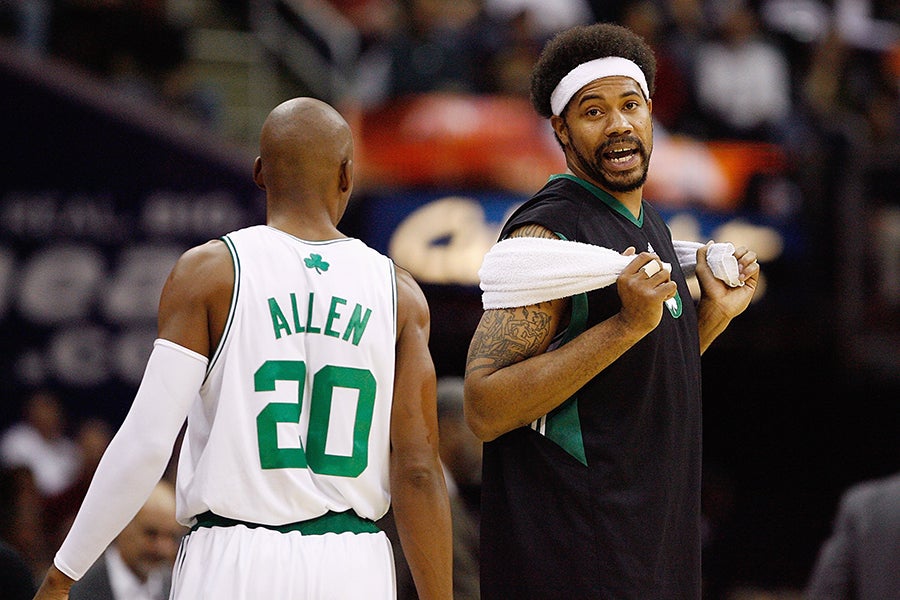 Gregory Shamus/Getty Images
Gregory Shamus/Getty ImagesRay Allen and Rasheed Wallace of the Boston Celtics talk during the game against the Cleveland Cavaliers on Oct. 27, 2009 at Quicken Loans Arena in Cleveland, Ohio. The Celtics won 95-89. (Photo by Gregory Shamus/Getty Images)
Meanwhile, the Lakers chugged along as defending champs, swapping Trevor Ariza for Ron Artest, a veteran defensive wing looking to rewrite his Wikipedia page after the “Malice at the Palace” five years prior.
When the teams crossed paths in Boston that January, Bryant stuck the game-winner right in Allen’s face. The following month, The Celtics survived a 13-0 fourth quarter run to escape LA with the victory.
By April, Boston had sunk to the 4 seed in the Eastern Conference, while 57 wins were enough for the Lakers to secure top spot out West.
The switch flipped, Boston surprised everyone by beating the three biggest superstars (LeBron James, Dwyane Wade and Dwight Howard) in the East in succession to advance to the Finals. The Celtics’ playoff position meant LeBron wasn’t even the final boss, as the veteran C’s rolled the top seeded Cavs in six games of the conference semis. Garnett later said the 2010 Celtics “broke” LeBron.
http://gty.im/577765500
“I do believe, that year, psychologically, LeBron James was a changed player,” says Maxwell. “(He) looked at the pieces around him and said, ‘I can’t beat the Celtics.”
The Lakers dropped just four games on the road to the Finals, dispatching the not-ready-for-prime-time Thunder, a Jazz team on the brink of implosion, and a fading facsimile of the Seven Seconds or Less Suns.
Artest’s impact was felt from the jump: his presence shielding a banged up Bryant from tough perimeter defensive assignments (like ascendant superstar Kevin Durant, who Artest held to 35 percent shooting in round one). There’d be plenty of meat left on that bone for the Finals, as the journeyman would square off with Pierce. Literally.
Final Battle
Artest engaged Boston’s scoring machine seconds into Game 1, resulting in a double technical, the first two of 54 total fouls in the contest. While Boston held the deserved reputation as the more physical team, the action checked a box in LA’s favor. Everything else fell into place: Kobe had 30, while Pau went for 23 and 14, his pivot arsenal on full display. The Lakers took the opener 102-89 for their 12th consecutive playoff home win.
Game 2 will forever be remembered as the Ray Allen game. The 34-year old buried a Finals record eight three-pointers, making seven in the first half alone: knifing off screens, his eyes alight, waiting for the room temperature ball to meet his fiery fingers before flinging it to the bottom of the net.
When the Lakers rallied in the second half, Boston point guard Rajon Rondo put the finishing touches on a triple double and Boston prevailed 103-94, the second time during the 2010 playoffs that the Celtics had grabbed a Game 2 on the road and with it, home court advantage.
http://gty.im/577989912
“Rondo had come into his own,” recalls Maxwell. “That started the year before - he took it to another level with his passing, rebounding and scoring ability. You’d go ‘wow,’ he almost won that game by himself, making play after play. It was kind of like those three guys (Allen, Garnett and Pierce) had given Rondo the reins to do what he wanted to do.”
It would also be the last time either team cracked 100 points, as the compound effects of hard screens and hard fouls produced a style that complemented the Brutalist architecture of Boston’s City Hall, a short walk from where Game 3 would be played.
Accordingly, the scoring stars of the first two games of the series were muted. Bryant had 29 points but needed 29 shots to get there. Allen went 0-for-13 from the field, one attempt shy of an NBA playoff record for futility.
The first two games in Boston were a showcase for the role players. Fisher grabbed the headlines with 11 points in the fourth quarter of Game 3, including a backbreaking bucket in the final minute. The determined veteran snagged an errant Allen jumper, pushed the ball past Garnett and layed it gently off the backboard as Allen, KG and Glen Davis hurtled past.
With the Celts in a 2-1 hole, Nate Robinson (12 points) took a Game 4 hack from Lamar Odom and hopped up in his face like a five-foot-nothing Hulk mouthing off at Andre the Giant in the Pontiac Silverdome. Glen “Big Baby” Davis (18 points) barreled over, under and through the Laker defense in his 22 minutes, corralling four offensive rebounds and leaving a big drool spot on the parquet floor.
http://gty.im/101967415
The series was tied.
Pierce’s 27 points, KG’s guile and Rondo’s pluck and artistry got the duke for the Green in Game 5 at home. The Celtics were just one win away from an 18th championship and a second pinfall victory over the Lakers in three years.
“(The Celtics) got screwed by the schedule,” Heisler admits. Between Game 5 and Game 6, there was one day in the middle. So they’re basically D.O.A. for Game 6. You knew the Lakers were going to have an advantage.”
LA cruised to a 22-point win as the Celtics shot 33 percent and submitted the second-lowest Finals scoring performance in over 50 years: 67 points. Kobe had 26. Gasol posted another double-double with 17 and 13, and Bynum - a regular presence in the trainer’s room - recruited some company. The Laker 7-footer went over the back of Boston bruiser Kendrick Perkins and one of the toughest players in the NBA crumbled to the ground with a torn ACL.
All the Marbles
Just three NBA Finals in the past 25 years have gone to seven games. Perkins would be stapled to the bench for the deciding contest. But the Celtics franchise had never before lost a Game 7 in the Finals.
“If the Celtics win, they’re back in charge of the whole rivalry,” Heisler narrates. “They would’ve won the last two and reasserted control over the whole thing.
“I remember being overwhelmed by the size, the scope, the pressure of it,” recalls Helin. “You could just feel it in Staples Center like never before. Everything felt different in the building.”
Celtics coach Doc Rivers summoned Wallace to replace Perkins in the starting lineup.
“Give us one game. Justify your presence,” Ryan barks. “Give us one goddamn good game when we really need it in Game 7. And (Wallace) didn’t. He couldn’t. I will take it to my grave that if they have Perkins, they win.”
Wallace was effective in the early going, and the Celtics took advantage of Bryant’s inability to throw the ball into the ocean (6-for-24 shooting) to push the lead to double digits in the second half.
http://gty.im/577760196
“Kobe is ice cold; the Celtics take this big lead in the third quarter,” remembers Heisler. “He was like Michael (Jordan): he lived for the clutch and he always came up big, but this was the one time in his life that he didn’t. You have this historically momentous Lakers-Celtics game and he’s not able to be Kobe.”
“Kobe was horrid in that game,” Maxwell states. “He couldn’t shoot it at all, but all of a sudden (the Lakers) got back into it because they got every offensive rebound. And that was probably because Perk wasn’t around and KG was playing on one leg.”
Gasol was a monster in Game 7, collecting 18 rebounds, nine on the offensive glass, to go with 19 points.
“Pau had a little more grit than everybody thought he did,” muses Helin.
“(The MVP) should’ve been Pau Gasol,” says Maxwell. “He was the best player for the Lakers at that particular time.”
Fisher’s fourth quarter three to tie it was the first poison dart. The Celtics, lacking an antidote, continued to clang away on long jumpers. The Lakers gobbled up the misses and wrangled their own on the other end, all the while wearing a path to and from the free throw line.
http://gty.im/105060375
For the game, Los Angeles grabbed 23 offensive boards to Boston’s eight.
In the fourth quarter, the Lakers attempted 21 free throws to the Celtics’ six.
“I’m not even remotely using the refs as an excuse for Game 7,” says Ryan.
“I just don’t think the Celtics were aggressive and I don’t think they had the energy at the end,” says Maxwell. “I think they gave it their all. I think they played as hard as they could. But I think the Lakers were determined to get back from ‘08.”
“[The Lakers] didn’t shoot well in Game 7 at all. Neither team did,” recalls Helin. “So it just became a matter of, ‘nobody’s shooting well; who’s getting the most shots? Who’s getting the most opportunities?”
With just over a minute left, Bryant dished to Artest, who briefly hesitated before burying a three, the home crowd exploding out of their seats. The Celtics bagged a trio of late triples, keeping the outcome in doubt, but when the clock hit zero, purple and gold confetti rained down.
“Artest was the guy in Game 7,” says Helin of the 20-point, five steal performance. “I think Phil Jackson called him the MVP. He seemed to float above the pressure. That pressure got to everybody else.”
“Losing is one thing,” says Ryan. “I can take losing to Kobe. I can take losing to Pau Gasol, who I firmly believe was the MVP. I will never, ever accept losing to Metta World Peace. Ron Artest came up big. And that hurts. That really stings. That pisses me off.”
The win cemented Bryant’s place alongside Kareem, Magic, Michael Cooper and teammate Fisher as the only Lakers with five NBA championships. And after two weeks of dodging questions about the Celtics, the star let loose after Game 7:
“This one is by far the sweetest, because it's them,” Bryant said. “This was the hardest one by far. I wanted it so bad, and sometimes when you want it so bad, it slips away from you. My guys picked me up.”
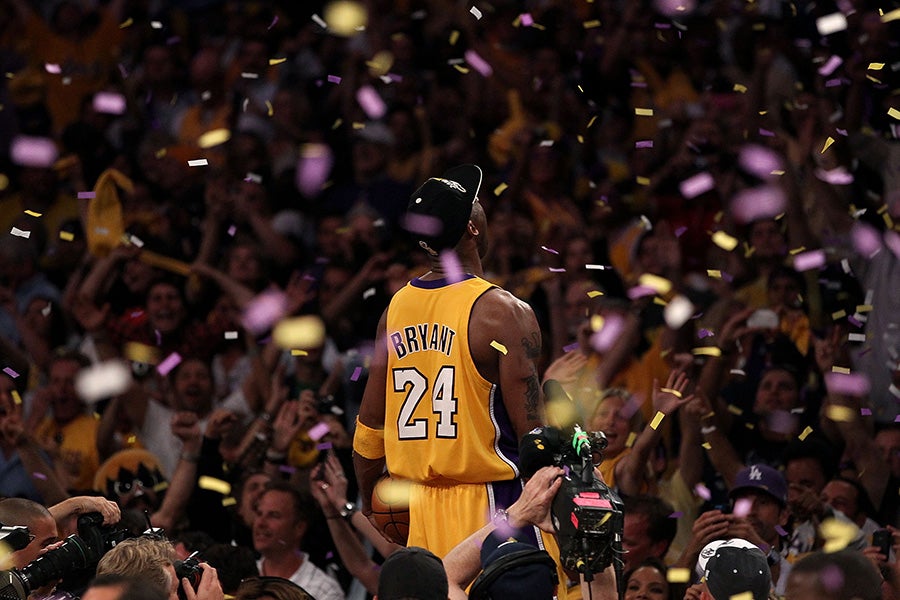
Kobe Bryant celebrates after the Lakers defeated the Boston Celtics in Game Seven of the 2010 NBA Finals at Staples Center on June 17, 2010 in Los Angeles, California. (Photo by Christian Petersen/Getty Images)
Says Heisler, “Bob (Ryan) was asking Kobe a lot of questions about the rivalry and Kobe was just completely downplaying it: pretending the rivalry meant nothing, he wasn’t aware of it, he didn’t care about it - all this stuff that was ridiculous on its face. As soon as it was over and he had his fifth championship, he acknowledged how much beating the Celtics meant to him.”
“That was Kobe walking the path by himself,” says Maxwell. “He needed that one. They beat Orlando - that was a cakewalk.”
“I just know that as a Laker legend, you have to beat the Celtics at some point, and he probably knew at that point in his career, it was going to be the last opportunity to do that,” Fisher later said in an interview. “That’s probably why he wanted to win it so badly.”
Heisler also remembers Bryant’s postgame jab at his former teammate and occasional tormenter: “I think the first thing he said was, “one more than Shaq.”
“The feud with Shaq was still there and now he had one more,” says Helin. “It was so different from ‘Wheaties box” Ron Artest - that kind of pure joy. Kobe was genuinely motivated by that. Anything you told him he couldn’t do...he had a mountain to climb.”
Meanwhile, the Celtics had fallen short of the summit in the most crushing fashion imaginable.
“I think it was truly a missed opportunity,” Maxwell reflects. ”A healthy Kevin Garnett, a healthy Perkins - you walk backwards and win that game.
“I will take to my grave that if (the Celtics) have Perkins, they win,” says Ryan. “They were less than five minutes away. And they let it get away.”
Says Helin: “I look at that series and how grinding and defensive it was and think, ‘how did the Celtics not win that series?’ It was their game!”
10 Years Gone
On July 8, 2010, LeBron James announced he was taking his talents to South Beach, forming a super team with Dwyane Wade and Chris Bosh and forever altering the trajectory of NBA history.
The Celtics would hang around as grumpy old men of the East for a few more years before rebuilding. Oddly, the Lakers - the younger team - found themselves on a similar timetable.
“Shaq and Kobe blew itself up,” says Helin. “There was a sense that they were going to be as good or better than anyone for as long as they could tolerate each other. I don’t think there was a sense that this team was going to last, or could have lasted in the same way. It felt like teams were going to catch them.”
In 2012, Kupchak swung for the fences, adding All-Stars Steve Nash and Dwight Howard to the mix.
“It just melted in spectacular fashion,” laments Helin. “It was as good an NBA train wreck as you’re ever going to see.”

Jan 20, 2020; Boston, Massachusetts, USA; Los Angeles Lakers guard Rajon Rondo (9) and Boston Celtics guard Kemba Walker (8) battle for the ball during the first half at TD Garden. Mandatory Credit: Bob DeChiara-USA TODAY Sports
10 years on from a gloriously unpretty NBA Finals, the Celtics and Lakers find themselves contenders again. With play set to resume sometime this summer, more than a few prognosticators see a 13th championship meeting between the two teams as a possibility.
Pierce, Fisher and Perkins, among others, have become the prognosticators, their faces beamed via cable TV to a new generation of NBA fans.
Rondo is a Laker.
Gasol is a free agent working his way back from injury, looking for one more crack at a title.
And Bryant, a tick over four years since he climbed his last NBA mountain (60 points in his final game), is gone.
Sean Sylver can be heard on 98.5 The Sports Hub. You can find him on Twitter @TheSylverFox.
